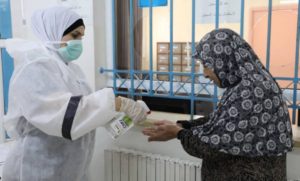
CONTEXT
COVID pandemic, economic crisis, few rights: Things are getting harder and harder for displaced Palestinians in Lebanon. One reason is the chronic underfinancing of the UN agency responsible for them.
Financial problems at the UNRWA
- The United Nations Relief and Works Agency for Palestine Refugees in the Near East (UNRWA) is responsible for the Palestinian refugees in the 12 official camps in Lebanon.
- This is because Lebanon does not accept any costs for the Palestinians.
- But the UN organization frequently becomes a pawn of political interests, as happened.
- for example, when former US President Donald Trump withdrew financing from the agency and made a dent in its finances to the tune of $300 million (€255 million) — his successor, Joe Biden, has announced he will commence payments again.
- The main criticism leveled at the UNRWA is that by looking after 5.7 million Palestinians in the region, it creates incentives for them not to integrate in other Arab countries so that they remain permanent refugees instead.
BACKGROUND
- The background to this argument is the Palestinians’ right of return enshrined in the UN Resolution 194, which is one of the big issues in the quest for a resolution to the Middle East conflict between Israelis and Palestinians.
- While Israel declared its independence on May 14, 1948, for Palestinians, May 15 of that year marked the start of their flight and forced displacement to today’s Palestinian territories and bordering countries, including Lebanon.
- However, what was initially considered to be a temporary solution for the Palestinians has now become a home for several generations.
- The UNRWA needs more than a billion US dollars each year to keep up its regular, emergency and lifesaving services.
Erosion of rights
- The Palestinians in Lebanon have never been recognized by a Lebanese government as having equal rights.
- This is partly because the Palestine Liberation Organization (PLO) was involved in fighting in the Lebanese Civil War, something that angered various political groups in the country.
- In Lebanon, Palestinian refugees pass on their refugee status to their children.
- They are not allowed to work in academic professions and are worse-paid than Lebanese with the same qualifications.
- The Lebanese side has always officially justified this exclusion with the argument that a complete integration of the refugees in Lebanon would make it harder for them to return home.
- So while the US, for example, would like to see the Palestinian refugees settle permanently in the country, Lebanon does not want them to.
- The Burj Barajneh camp was originally meant to house 3,500 people. But the UNRWA has officially registered 20,000 Palestinians in the camp, and, with the arrival of more refugees from war-torn Syria, the actual number of residents is believed to be twice as high as that.
No room for quarantine
The lanes in the camp are narrow. Residents often cynically say that not even a coffin can get through them. Wherever you go, a tangle of telephone wires and uncovered electrical cables hangs above your head — residents regularly die from electrocution when it rains.
The coronavirus pandemic has put more financial pressure on the UNRWA.
Unprecedented levels of despair with growing hunger & anger, money was needed for food, the COVID response and “dignified shelters.

